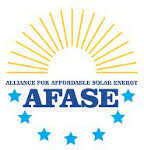 PwC study fails to provide evidence for positive effect of punitive duties
PwC study fails to provide evidence for positive effect of punitive duties
The PwC study falls short in its attempt to falsify the Prognos study. It makes incorrect assumptions and strikingly fails to deliver its own analysis that duties would have a net positive impact on employment as argued by EU ProSun.
AFASE would like to respond to the following arguments made in the PwC study:
1. PwC says AFASE is wrong in claiming that anti-dumping duties will lead to a loss of 242,000 jobs when according to the European Solar Industry Association (EPIA) there are currently a total of 265,000 solar jobs in Europe.
Prognos started from the premise that, without these duties, the demand for solar panels is likely to increase and the production costs most likely further decrease. The study then measured the impact of duties starting from the higher future demand. Thus, it takes into account the impact on existing employment and value added but also on the employment and value added that would have been achieved as a result of decreasing costs and pricing being such to allow increased PV installations.
Moreover, the results of the Prognos study are based on conservative calculations. The European Photovoltaic Industry Association states that along the PV value chain about 32-60 jobs are created within the EU per each MW of additionally installed capacity. The calculated reduction of labor force in the Prognos study ranges at the lower bound of these numbers. In Prognos’ calculations – whatever scenario or year observed – not more than 30 jobs will be lost per MW. If we take the positive effects on employment at the EU producers of solar products into account this number might even decrease to 23-25.
2. With reference to the US, EU ProSun argues that 2012 has been a record year for PV installations and the number of jobs in the American solar industry has risen steadily although anti-dumping and countervailing duties (AD / CVD) have been imposed. PwC says that “this is a useful example to illustrate that there are good reasons not to believe alarming studies which are based on vague data”.
2012 may have been a record year in the US, but the comparison of developments on the US market with the potential impact of tariffs in the European market is highly misleading for the following two reasons (see also AFASE position paper on the US market):
Different product scope: EU investigations include Chinese origin wafers, cells and modules, while the US duties apply to Chinese origin cells only whether or not integrated in modules. Modules manufactured in China from non-Chinese cells are not subject to the US AD / CVD. Chinese modules can therefore continue to be customs cleared in the US without being subject to AD / CVD. If imports into the USA of modules manufactured in China incorporating Chinese cells have decreased while US installations have spiked, it is precisely because demand is being met by modules manufactured in China using non-Chinese cells in addition to modules manufactured 2
outside China. That means that developments in the US are not a meaningful basis to assess the impact of duties in the EU.
Two very different markets: The US market differs extremely from that in Europe. For example, whilst the market for thin-film solar products is very small in the EU, the market is significant in the US where such products dominate the market for large ground-mounted installations. Not only are there few Chinese producers of thin-film solar products but the demand for large ground-mounted installations in the USA is primarily served by non-Chinese solar producers and the US company First Solar in the first place. Accordingly, a very important segment of the US market is not affected by the AD / CVD for Chinese products. In the EU, on the contrary, the demand for large ground-mounted installations is primarily served by crystalline solar products that are the subject of the ongoing investigations.
3. PwC tries to falsify the Prognos study by claiming that it is highly questionable “that the assumption that volumes of production inputs (e.g. machinery and raw material) exported from Germany to China will remain constant.” It is assumed that China will overtake the production of these goods and become independent from European imports.
This assumption is not questionable whatsoever. First, the fact that China would increase production of materials and start production of machinery so as to no longer buy these from EU suppliers rests on assertion only. There is no shred of evidence of this. All EU suppliers of materials and production equipment (e.g. Wacker, Applied Materials and the German machinery industry association VDMA) explicitly and decidedly have requested the EU not to impose anti-dumping duties arguing that these will affect their interests. They should be in the best position to assess what is in their interests.
4. PwC offers nothing to prove that duties will not have a significant impact on employment and EU value added
The PwC study does not even attempt to prove that the duties will not have the impact on employment as forecasted by Prognos or that the impact on employment of the EU manufacturers of solar products is higher than calculated by Prognos. So far the Prognos study is the only solid economic research that analyses the impact of duties on Chinese solar products on EU jobs and value added.
It should also be pointed out that Prognos is regarded as a high-quality research firm which has undertaken numerous researches on the energy market for the German government and also for the German solar association (BSW) at a time where Solarworld was on the board of the BSW.
Brussels / Bucuresti, 22.05.2013




